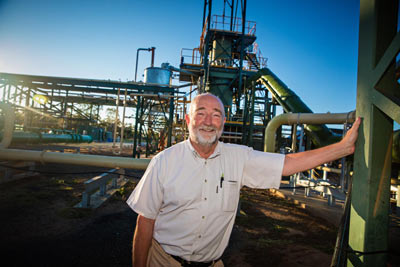
Bringing their first tyre recycling plant at Warren, New South Wales up to full production is a priority for Green Distillation Technologies following the recent awarding of Environmental Permission by the New South Wales authorities.
GDT Chief Operating Officer Trevor Bayley said that they have always believed that once they had all the Government permissions in place it was then down to business, build the remainder of Warren plant to full design capacity and process tyres.
“By way of explanation, our plant design is for six tyre processing modules and during the interim while we were negotiating for expansion at Warren we have completed one module as a test facility and our next step is the immediate building of modules two and three.
“We already have the bits and pieces to build these two modules while we raise capital to build the other three and achieve the capacity to process approximately 700,000 old tyres per year into eight million litres of oil, 7700 tonnes of carbon black and 2000 tonnes of steel, which represents approximately 4% of the end-of-life tyres that are generated in Australia each year.
“We see the permission as the reward for over 4 years of persistent effort to correct something that should have never happened as we were ‘collateral damage’ when the regulations were changed in 2015 and the use of the word “energy” was one of the problems as in the context of the new regulation it was taken to mean ‘electricity’,” he said.
Trevor Bayley agreed that they certainly turn waste tyres into energy, but the energy they produce is packaged differently.
“Our energy production comes in the form of oil and carbon which are both commodities very high in energy content and since there are no facilities using Tyre Derived Fuel (TDF) in NSW, then GDT was the only tyre recycler to be impacted.
“Being a new regulation the NSW EPA had to let it run its course and to their credit, the personnel within the EPA have always given us the impression that they were doing their best to accommodate us but they had other priorities and our small voice was not getting through. The potential for a higher judicial authority to be called upon to make a judgement on the issue brought them back to the table in a more constructive frame of mind and the licence was finally able to be granted.
“Our tyre recycling process is pioneering technology and Warren is the first of 7 plants planned for Australia as well countless more around the world.
“Already we have environmental permission from the Queensland Government and Development Approval from the Toowoomba Regional Council for a plant in their area and we have enquiries from several other regional centres of significant tyre collection importance,” he said.
“But in many respects Warren as the first one is the most important, because not only does it demonstrate the effectiveness of the technology at the commercial level and further promotes all its environmental credentials, it removes risk for the investor and establishes markets for the products.
“The most significant benefit of the Environmental Protection Licence for a small start-up business like GDT trying to build a presence in what is now a competitive tyre recycling marketplace, is that of removal of risk, as this allows the entry of a cornerstone investor and the subsequent funding to roll out the second plant”, he said.
Trevor Bayley agreed that Warren seemed to be an unlikely location for a tyre recycling plant as it is a small rural town dependent on the agriculture industry and subsequently there is little opportunity for local full time employment other than with the council and industries that support the farming community.
“Even a small employer like GDT is welcome and the people of Warren have embraced GDT with open arms since our Technical Director Denis Randall started his first experiments in 2004.
Trevor Bayley agreed that although Warren may seem like an out of the way place, it is strategically well located as it is on the Oxley Highway, North West of Dubbo, which is the main truck transport route between Melbourne and Brisbane and is located on a rail link with trains transporting cotton, wheat and wool to the major cities and a backload of old tyres is welcome revenue. The plant occupies approximately 4 hectares of the 21 hectare site leaving space for expansion and other projects, synergistic industries and tyre storage within the limits imposed by NSW Environment Protection Authority.
“This NSW Environmental Protection Licence means we can finally do what we set out to do in the region, provide employment and a boost to the local economy.
“As the first of its kind in the world the GDT Warren plant has already attracted a large number of visitors, both national and international and this flow is set to grow.
“We have also contributed to the diversity of the population with workers from Iran, Sri Lanka, South America and other parts of Australia coming for short periods of time. We now have a full time senior employee from Bangladesh who, with his wife and young son, are making Warren their home, including becoming the backbone of the local cricket team,” Trevor Bayley added. Released for Green Distillation Technologies by Dennis Rutzou Public Relations (www.drpr.com.au)



